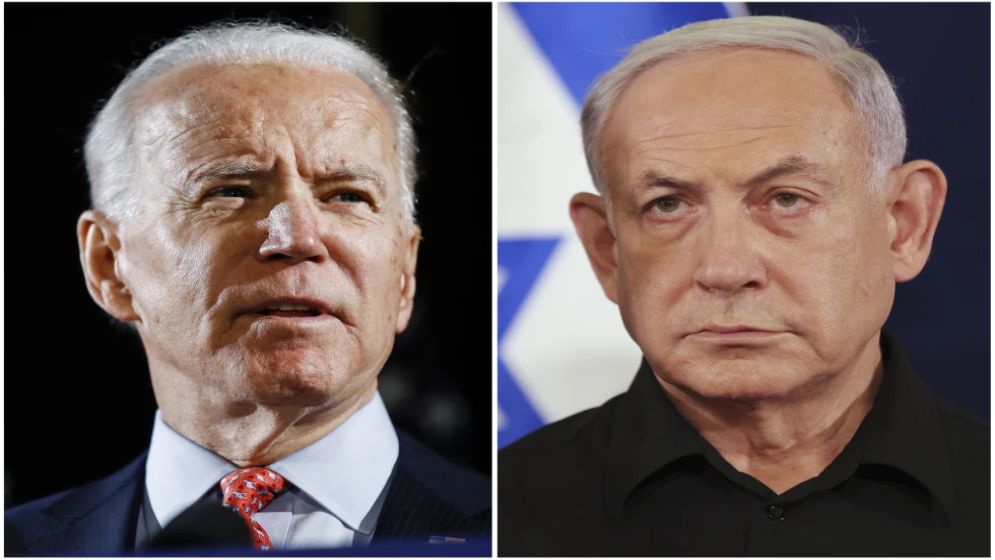Biden and Netanyahu hold their first conversation in weeks. Trump recently called the Israeli leader
UNB
Publish: 10 Oct 2024, 02:54 PM

WASHINGTON
(AP) - President Joe Biden and Israeli Prime Minister Benjamin Netanyahu on
Wednesday held their first call in seven weeks, a conversation that comes as
Israel expands its ground incursion into Lebanon and considers how to respond
to Iran's recent ballistic missile attack.
Vice President Kamala
Harris also joined the 30-minute call, according to the White House.
"It was direct, it
was productive," said White House press secretary Karine Jean-Pierre, who
added that the leaders discussed a long list of issues on the call, including
Israel's deliberations on how it will respond to Iran.
Netanyahu's office,
meantime, confirmed that the prime minister had recently spoken with former
President Donald Trump. The Republican, who is in the midst of a close White
House race against Harris, called Netanyahu last week and "congratulated
him on the intense and determined operations that Israel carried out against
Hezbollah," according to Netanyahu's office.
The Biden-Netanyahu
conversation comes at a moment of Biden's growing frustration with the prime
minister and as the growing conflict in the Middle East is adding a layer of
complexity to the American election next month.
Netanyahu has repeatedly
looked past the Biden administration's calls for cease-fires. They would at
least temporarily pause the fighting in Gaza, facilitate the release of some
100 hostages, who have been held by Hamas since the Oct. 7, 2023, attack on
Israel, and stem the growing conflict between the Israel and Hezbollah militants
in Lebanon.
The spreading conflict
across the Mideast is looming over Harris in the final weeks of the White House
campaign.
Some Arab-American
voters in closely contested Michigan, and elsewhere, are threatening to
withhold their support for the Democrat over their dissatisfaction with the
administration's handling of the war in Gaza. Trump has increasingly criticized
Harris and Biden for their foreign policy decisions as he makes his case to
American voters to return him to the White House.
The Trump campaign said
it should not be surprising that Netanyahu held talks with the former
president.
"World leaders want
to speak and meet with President Trump because they know he will soon be
returning to the White House and will restore peace around the globe,"
Trump campaign spokesperson Karoline Leavitt said in a statement about that
call, which a Trump ally, Sen. Lindsey Graham, R-S.C., joined.
"As we know, it's
one president at a time here," Jean-Pierre when asked about Trump's call
with Netanyahu.
Following the call with
Netanyahu, Biden and top aides joined a call with American rabbis to belatedly
mark the Jewish high holidays. They underscored the administration fully
supports Israel's right to defend itself against Iran and its proxies.
"We're also
committed to holding Iran fully accountable for that attack, and we will
continue to do so," said Brett McGurk, the White House coordinator for the
Middle East and North Africa.
Biden told reporters
last week that he did not know whether Netanyahu was holding up a Mideast peace
deal in order to influence the outcome of the U.S. election.
"No administration
has helped Israel more than I have. None. None. None. And I think Bibi should
remember that," he said, referring to the Israeli leader by his nickname.
"And whether he's trying to influence the election, I don't know, but I'm
not counting on that."
Israel has been
discussing how to respond to the Iranian missile barrage from Oct. 1, which the
United States helped to fend off. Biden last week said he would not support a
retaliatory Israeli strike on sites related to Tehran's nuclear program.
Biden has urged Israel
to consider alternatives to hitting Iran's oil sector. Such a strike could
affect the global oil market and boost pump prices, developments that would not
help Harris' efforts to win over the shrinking number of undecided voters.
Netanyahu's other
choices range from a largely symbolic strike - similar to how Israel responded
after Iran launched missiles and attack drones in April at Israel.
"Our attack will be
lethal, precise and above all surprising," Israeli Defense Minister Yoav
Gallant said during a speech to Israeli troops on Wednesday. "They will
not understand what happened and how it happened."
Since the leaders' last
call on Aug. 21, Israel has carried out a brazen sabotage and assassination
campaign against Iran-backed Hezbollah in Lebanon, where the militant group has
continued to fire missiles, rockets and drones at Israel.
Israel is now
undertaking what it has described as limited ground operations across its
northern border with Lebanon to dig out Hezbollah. Airstrikes killed the
group's leader, Hassan Nasrallah, and decimated its leadership.
Last month, thousands of
explosives hidden in pagers and walkie-talkies used by Hezbollah detonated,
killing dozens of people and maiming thousands, including many civilians.
Israel is widely believed to be behind the attack
The U.S. has maintained
a stepped-up troop presence in the region, to defend Israel and American
interests in the Middle East. Washington has grown increasingly vocal with
Israeli officials about the need to be kept in the loop on their
decision-making to ensure the protection of U.S. forces.
Gallant had been
scheduled to meet with Defense Secretary Lloyd Austin on Wednesday, but the
Israelis postponed the visit, according to Pentagon spokeswoman Sabrina Singh.
The Biden-Netanyahu call
took place one day after disclosures from journalist Bob Woodward's new book,
"War" that Biden has privately made his frustration and distrust of
the Israeli leader known.
The president privately
unleashed a profanity-laden tirade, calling him a "son of a bitch"
and a "bad f--- guy," according to the book.
Biden said he felt, in
Woodward's accounting, that Netanyahu "had been lying to him
regularly," with Netanyahu "continuing to say he was going to kill
every last member of Hamas." Woodward wrote, "Biden had told him that
was impossible, threatening both privately and publicly to withhold offensive
U.S. weapons shipment."
____
